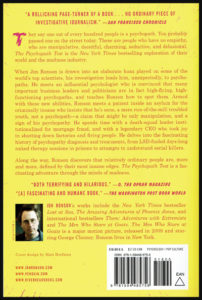“The Psychopath Test” is a very interesting book for those who want to demystify what lies behind the term “psychopath” or “sociopath”. The author also writes about what leads to a medical misdiagnosis of a mental illness in a person. Despite the fact that writing on psychopaths is a serious task, the text is written with a bit of humor and derision, the author often putting forward his own insecurities and neurosis.
Although the book’s main theme is about psychopathy, the spectrum of subjects is quite large and all the stories are interesting, if not surprising. Numerous cases that have made the news throughout the years are brought back to memory, but with new details that allow a deeper understanding.
Misdiagnosis
It is quite surprising to realize how easy it is to make mistakes in the diagnosis of mental illnesses. There are also several mental illnesses that can be attributed to individuals who do not have a behavior that is considered as strictly “normal” in our society. But since what is standard and acceptable vary throughout the years and societies, it seems obvious that a mental illness can be attributed to a person who is not really sick.
It is quite troubling to realize that mental illnesses will be attributed to children while the particular symptoms of those illnesses are known to become apparent only when a person becomes an adolescent or adult.
Faking madness to avoid prison time is not particularly wise…
The author shows how different personal interpretations by all kinds of “specialists” on the multiple criteria used to diagnose several mental illnesses sometimes result in a person being sent wrongly to a mental institution where she will be heavily medicated for a very long period.
A particularly interesting story is that of a man who faked madness after having committed a violent crime in order to avoid being sent to jail, thinking that he would instead be sent to a psychiatric institution where life is relatively comfortable. He was sent, like he wanted, to a psychiatric institution, but not the one he expected. He spent more than twelve years at Broadmoor, in England, an institution where serial killers and pedophiles are imprisoned.
In his case, the Robert Hare’s list was used. This is a list which is used to determine if a person is a psychopath. His luck turned when the “specialists” considered that he met most of the criteria on the list. He then had to fight for years to prove that he was victim of a wrong interpretation…
Some particularly weird psychotherapy sessions
The author mentions some of the weird experiments that went on to heal patients, experiments that were destined to fail before they even started. For example, the reader learns of psychotherapies where the patients were nude and under LSD influence. Another experiment involved criminals who had to heal each other: they could not stay away and distant from each other as they were taped together, like this serial killer of three children in Toronto who was taped to a car thief…
The negative effects of psychopaths that are highly placed in society
The author tries to verify, using the Robert Hare’s list, if it is true that psychopaths are ruling the world. He admits he partially failed. This seems reasonable since there is about 1% of the population that is composed of psychopaths, and that percentage grows to 3% with politicians and corporate leaders. So, from 3% to 100%, it seems obvious that this was a tall order to start with.
The author quotes one of his sources, Essi Viding, who studies psychopaths: “Psychopaths don’t change. The best you can hope for is that they’ll eventually get too old and lazy to be bothered to offend. And they can seem impressive. Charismatic. People are dazzled. So, yeah, the real trouble starts when one makes it big in mainstream society” (p.60)
Active psychopaths on the stock market can be as dangerous as psychopaths that are serial killers. As Robert Hare writes it: “Serial killers ruin families. Corporate and political and religious psychopaths ruin economies. They ruin societies” (p.112)
The twenty-point Hare PCL-R Checklist to establish if somebody is a psychopath
Here is a summary of the twenty points included in the Robert Hare’s Checklist. If a person scores 30 or more out of 40, she is considered as a psychopath:
1. Glibness/superficial charm
2. Grandiose sense of self-worth
3. Need for stimulation/proneness to boredom
4. Pathological lying
5. Conning/manipulative
6. Lack of remorse or guilt
7. Shallow affect
8. Callous/lack of empathy
9. Parasitic lifestyle
10. Poor behavioral controls
11. Promiscuous sexual behavior
12. Early behavior problems
13. Lack of realistic long-term goals
14. Impulsivity
15. Irresponsibility
16. Failure to accept responsibility for own actions
17. Many short-term marital relationships
18. Juvenile delinquency
19. Revocation of conditional release
20. Criminal versatility
The psychopath Emmanuel (Toto) Constant and Haiti
Talking of American politics, the reader discovers Emmanuel (Toto) Constant and the consequences of his actions for Haiti. He is a mass murderer, psychopath, who was working for the CIA in Haiti. He was released from jail when he implied that he would reveal secrets on the American foreign policy in Haiti. Emmanuel Constant “profoundly altered Haitian society for three years, set it spiraling frantically in the wrong direction, destroying the lives of thousands, tainting hundreds of thousands more.” (p.129)
Reality TV and selected mental illnesses
The author also develops the reality TV theme, where guests face each other and fight aggressively, verbally or even physically. He interviewed a person who was in charge of finding the appropriate guests for each program. He learned that the candidates were chosen according to the type of drugs they were taking to stabilize their mental illness. This is not done without making some mistakes and he learned that a member of a family killed herself because she felt guilty about the way she behaved in preparation for the TV program.
Are you a psychopath?
Are you a psychopath? “If you’re beginning to feel worried that you may be a psychopath, if you recognize some of those traits in yourself, if you’re feeling a creeping anxiety about it, that means you are not one” (p.114). The psychopath has no emotions about his own situation: he is not sad about it, does not question himself as to his situation no more than is he happy to be classified as a psychopath.
The financial interests of huge pharmaceutical companies
Obviously, huge financial interests are at play when it comes to prescribing medication to millions of patients susceptible to be diagnosed with a specific mental illness: the role and pressure exerted by pharmaceutical companies are rightly raised in the book:” There are obviously a lot of very ill people out there. But there are also people in the middle, getting overlabeled, becoming more than a big splurge of madness in the minds of the people who benefit from it” (p.267)
Some personal comments
On few occasions, the author’s reasoning surprised me. For example, he founds abnormal to take the time to write articles on a blog since there is no pay to be expected. Should I assume that every act of creativity in society has to be done in exchange for money, otherwise it makes no sense? In another chapter where there is a mention of the 9/11 attacks, he writes: “9/11 obviously wasn’t an inside job”. The word “obviously” replaces what should be an appropriate research on the subject since half of the American population still has unanswered questions about those attacks.
Conclusion
As a conclusion, here is quote that, I think, best resumes the author’s thoughts: “There is no evidence that we’ve been placed on this planet to be especially happy or especially normal. And in fact our unhappiness and our strangeness, our anxieties and compulsions, those least fashionable aspects of our personalities, are quite often what lead us to do rather interesting things” (p.271).
Title: The Psychopath Test
Author: Jon Ronson
Edition : First Riverhead
©2012
ISBN : 978-1-59448-575-6

